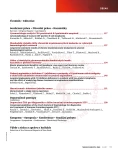-
Medical journals
- Career
Acquired angioedema with C1 inhibitor deficiency in a patient with low-grade B-lymphoma and the effect of underlying disease treatment on angioedema manifestations
Authors: M. Sobotková 1; J. Segethová 2
Authors‘ workplace: Ústav imunologie 2. LF a FN Motol, Praha 1; Oddělení klinické hematologie FN Motol, Praha 2
Published in: Transfuze Hematol. dnes,23, 2017, No. 3, p. 145-150.
Category: Comprehensive Reports, Original Papers, Case Reports
Overview
Acquired angioedema with C1 inhibitor deficiency is a rare disease manifesting as recurrent angioedema of the skin and mucous membranes in different locations. It is usually associated with haematological malignancies or monoclonal gammopathy. According to current findings, treatment of the underlying hematologic disease may prevent angioedema attacks in many cases. In our case report, we present a female patient suffering from acquired angioedema with C1 inhibitor deficiency and subsequently diagnosed with splenic lymphoma. Treatment of the lymphoma resulted in the normalisation of complement parameters and complete disappearance of angioedema attacks.
KEY WORDS:
angioedema – C1 inhibitor – bradykinin – marginal zone splenic lymphoma
Sources
1. Hakl R, Kuklínek P. Hereditární angioedém. Postgraduální medicína 2013;1 : 86–89.
2. Kuklínek P, Hanzlíková J. Hereditární angioedém. Praha, Medical Tribune CZ, 2013; 74 s.
3. Cicardi M, Aberer W, Banerji A, et al. Classification, diagnosis, and approach to treatment for angioedema: consensus report from the Hereditary Angioedema International Working Group. Allergy 2014;5 : 602–616.
4. Zingale LC, Castelli R, Zanichelli A, Cicardi M. Acquired deficiency of the inhibitor of the first complement component: presentation, diagnosis, course, and conventional management. Immunol Allergy Clin North Am 2006;4 : 669–690.
5. Gobert D, Paule R, Ponard D, Levy P, et al. A nationwide study of acquired C1-inhibitor deficiency in France: Characteristics and treatment responses in 92 patients. Medicine (Baltimore) 2016;33:e4363.
6. Cugno M, Castelli R, Cicardi M. Angioedema due to acquired C1-inhibitor deficiency: a bridging condition between autoimmunity and lymphoproliferation. Autoimmun Rev 2008;2 : 156–159.
7. C astelli R, Wu MA, Arquati M, Zanichelli A, et al. High prevalence of splenic marginal zone lymphoma among patients with acquired C1 inhibtor deficiency. Br J Haematol 2016;6 : 902–908.
8. Castelli R, Zanichelli A, Cicardi M, Cugno M. Acquired C1-inhibitor deficiency and lymphoproliferative disorders: a tight relationship. Crit Rev Oncol Hematol 2013;87 : 323–332.
Labels
Allergology and clinical immunology Haematology Internal medicine Clinical oncology
Article was published inTransfusion and Haematology Today

2017 Issue 3-
All articles in this issue
- Blastic plasmacytoid dendritic cell neoplasm: case report and literature review
- Cytomorphology of mature CD5-positive B-cell neoplasms
- Long-term treatment results of chronic myelomonocytic leukaemia in selected haematological centres
- Acquired angioedema with C1 inhibitor deficiency in a patient with low-grade B-lymphoma and the effect of underlying disease treatment on angioedema manifestations
- Idarucizumab: a single centre experience
- Transfusion and Haematology Today
- Journal archive
- Current issue
- Online only
- About the journal
Most read in this issue- Long-term treatment results of chronic myelomonocytic leukaemia in selected haematological centres
- Blastic plasmacytoid dendritic cell neoplasm: case report and literature review
- Acquired angioedema with C1 inhibitor deficiency in a patient with low-grade B-lymphoma and the effect of underlying disease treatment on angioedema manifestations
- Cytomorphology of mature CD5-positive B-cell neoplasms
Login#ADS_BOTTOM_SCRIPTS#Forgotten passwordEnter the email address that you registered with. We will send you instructions on how to set a new password.
- Career

